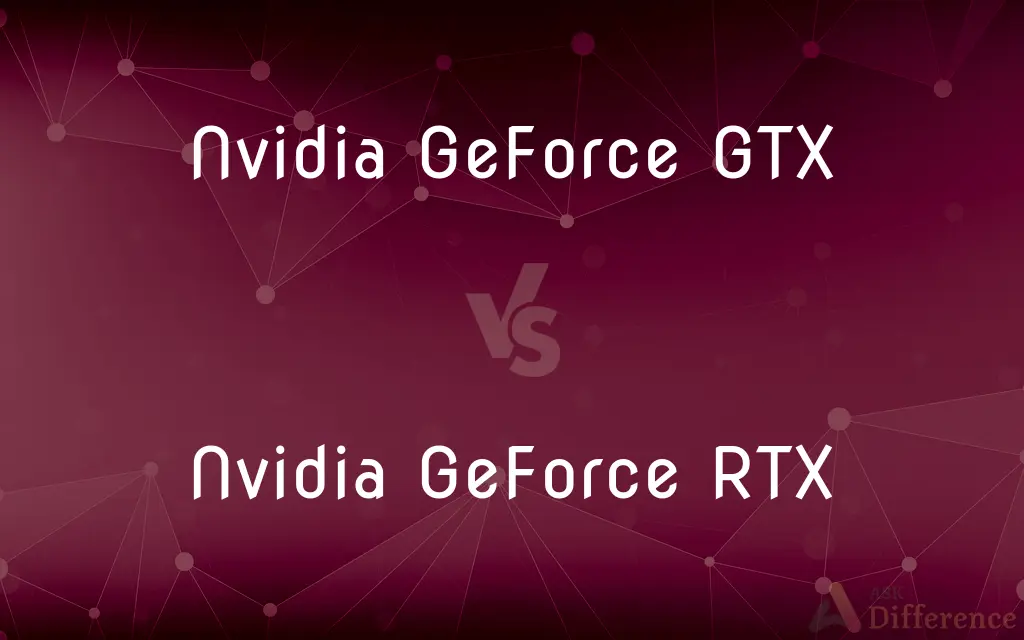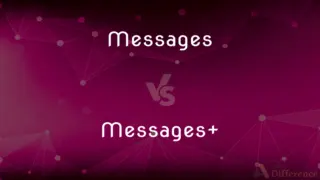Nvidia GeForce GTX vs. Nvidia GeForce RTX — What's the Difference?
By Tayyaba Rehman — Published on January 20, 2024
Nvidia GeForce GTX cards focus on traditional gaming performance, while RTX cards offer advanced features like ray tracing and AI-driven enhancements.

Difference Between Nvidia GeForce GTX and Nvidia GeForce RTX
Table of Contents
ADVERTISEMENT
Key Differences
Nvidia GeForce GTX graphics cards are designed for mainstream gaming and are known for their reliable performance in traditional gaming environments. Nvidia GeForce RTX cards, on the other hand, represent the newer generation of graphics cards, offering advanced features like real-time ray tracing and AI-enhanced graphics.
The GTX series does not support ray tracing, which is a key feature of the RTX series. Ray tracing technology in RTX cards allows for more realistic lighting, shadows, and reflections in games, providing a more immersive gaming experience.
RTX cards are equipped with Tensor Cores and RT Cores, which are absent in the GTX series. Tensor Cores enable AI processing which enhances gaming performance and image quality, while RT Cores are dedicated to managing ray tracing tasks efficiently.
In terms of price, Nvidia GeForce GTX cards are generally more affordable, making them a popular choice among average gamers. RTX cards, with their advanced features, tend to be more expensive, targeting enthusiasts and professional gamers.
While GTX cards offer excellent performance for most current games, RTX cards are more future-proof, catering to upcoming games that utilize ray tracing and AI-driven graphics enhancements.
ADVERTISEMENT
Comparison Chart
Core Technology
Traditional rasterization technology
Ray tracing and Tensor Cores for AI
Ray Tracing Support
No ray tracing support
Advanced real-time ray tracing
Target Audience
Mainstream gamers
Enthusiasts and high-end gamers
Price Range
Generally more affordable
More expensive due to advanced features
Future-Proofing
Good for current games
Better for future ray tracing games
Compare with Definitions
Nvidia GeForce GTX
GTX cards are known for delivering reliable gaming performance.
Playing on her Nvidia GeForce GTX, she enjoys smooth frame rates in most games.
Nvidia GeForce RTX
Nvidia GeForce RTX represents the cutting-edge in gaming graphics technology.
Her Nvidia GeForce RTX card is equipped to handle future games with advanced graphics.
Nvidia GeForce GTX
These cards focus on traditional rendering techniques without ray tracing.
His Nvidia GeForce GTX card handles traditional game graphics exceptionally well.
Nvidia GeForce RTX
Nvidia GeForce RTX is a series of graphics cards with advanced ray tracing capabilities.
His Nvidia GeForce RTX card renders stunning lighting effects in his games.
Nvidia GeForce GTX
Nvidia GeForce GTX is a line of graphics cards geared towards mainstream gaming.
His gaming PC is equipped with a Nvidia GeForce GTX card, perfect for his favorite games.
Nvidia GeForce RTX
These cards are designed for enthusiasts and high-end gaming setups.
For his high-end gaming rig, he went with a Nvidia GeForce RTX card.
Nvidia GeForce GTX
Nvidia GeForce GTX offers a balance of performance and affordability.
He chose a Nvidia GeForce GTX for its cost-effective gaming performance.
Nvidia GeForce RTX
RTX cards incorporate AI-driven graphics enhancements using Tensor Cores.
The Tensor Cores in her Nvidia GeForce RTX improve image quality through AI processing.
Nvidia GeForce GTX
The GTX series is popular among average gamers for its efficiency.
Her Nvidia GeForce GTX provides great gaming experiences without breaking the bank.
Nvidia GeForce RTX
RTX cards are more expensive due to their enhanced features and performance.
He invested in a Nvidia GeForce RTX for its superior gaming capabilities.
Common Curiosities
What's the main difference between GTX and RTX cards?
GTX cards focus on traditional gaming, while RTX cards offer advanced features like ray tracing and AI enhancements.
Is the price difference between GTX and RTX significant?
Yes, RTX cards are generally more expensive due to their advanced technology.
Can I use RTX cards for professional graphic work?
Yes, RTX cards are well-suited for professional graphics and rendering tasks.
Are RTX cards better than GTX for all games?
RTX cards are better for games that utilize their advanced features, but GTX cards still perform well in most current games.
Can I upgrade from a GTX card to an RTX card easily?
Upgrading depends on your system's compatibility with the new card in terms of power and space.
Are GTX cards good for casual gaming?
Yes, GTX cards are excellent for casual and mainstream gaming.
Can GTX cards perform ray tracing?
Traditional GTX cards do not support ray tracing; this feature is specific to RTX cards.
Are RTX cards compatible with all motherboards?
Compatibility depends on the motherboard's slot interface and power supply, not just the card series.
Do RTX cards improve gaming frame rates?
RTX cards can improve frame rates, especially in games optimized for their architecture.
Do RTX cards require more power than GTX?
Generally, RTX cards require more power due to their advanced features.
Is ray tracing only available on RTX cards?
Ray tracing is a hallmark feature of RTX cards, not available in traditional GTX models.
Will GTX cards be able to run future games effectively?
GTX cards should run future games well, though they may not support advanced features like ray tracing.
Do GTX cards offer VR capabilities?
Yes, many GTX cards are capable of running VR applications effectively.
Are GTX cards less durable than RTX cards?
Durability depends more on the specific model and usage rather than the series. Both GTX and RTX cards are built to last.
What are Tensor Cores in RTX cards?
Tensor Cores are specialized processors in RTX cards for handling AI computations.
Share Your Discovery

Previous Comparison
Hufflepuff vs. Ravenclaw
Next Comparison
Messages vs. Messages+Author Spotlight
Written by
Tayyaba RehmanTayyaba Rehman is a distinguished writer, currently serving as a primary contributor to askdifference.com. As a researcher in semantics and etymology, Tayyaba's passion for the complexity of languages and their distinctions has found a perfect home on the platform. Tayyaba delves into the intricacies of language, distinguishing between commonly confused words and phrases, thereby providing clarity for readers worldwide.











































